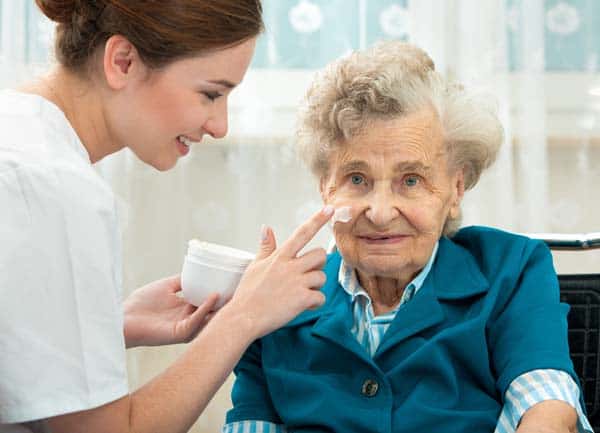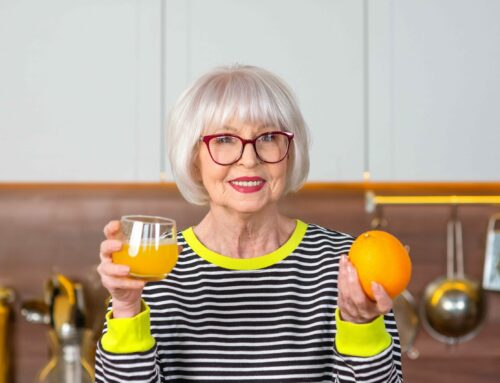As we age, our skin goes through a variety of changes. That’s why it’s so important to know how to take care of our skin as its needs evolve. Over time, the skin decreases its production of collagen and elastin, two beneficial proteins. If you’ve had more exposure to sun and harsh weather conditions, your skin may be showing that, as well.
According to the National Institute on Aging, there are some ways you can ensure your skin is well-pampered as you enjoy your golden years.
Cleanse and Moisturize Daily
As we age, our skin cells crave moisture and need clear, clean pores to remain healthy. Developing a daily habit of cleansing with lukewarm water and a gentle cleanser is a great start to making sure your skin is well cared for. Cleansing should always be followed by a gentle, fragrance-free moisturizer to keep the skin sufficiently hydrated.
You should try to avoid harsh soaps and lotions, alcohol-based products, and artificial scents.
If you or your senior loved one has been diagnosed with a condition that makes it difficult to care for their skin on their own, be sure their caregiver is tending to this important need on a daily basis.
Limit Sun and Wind Exposure
While it is good to spend some time in the sun each day without sunscreen, it is important to wear sunscreen when you know you’ll be out for longer periods of time. Even in the colder winter months, too much unprotected sun exposure can damage the skin. In the colder months, too much wind exposure can also be damaging to the skin, so be sure to wear hats, gloves, and scarves to protect delicate skin while outdoors in the elements.
Quit Smoking
If you’re a smoker, there’s no better time to quit than today. No matter your age, there are many health benefits to quitting immediately, including helping your skin. The carbon monoxide in cigarette smoke depletes the skin cells of oxygen while the nicotine reduces blood flow, affecting pigmentation and overall skin health. Additionally, precious collagen and elastin levels decline more rapidly when you smoke.
Even if you don’t personally smoke, it’s wise to also stay away from people and places where you may encounter a lot of second-hand smoke, as well.
Stay Hydrated
Guzzle your water every day. Keep track of how much you’re drinking so you’re sure to get enough on a daily basis. Especially in the winter months, seniors can get dehydrated quickly due to less feelings of thirst and colder temperatures.
Because our skin is less able to maintain moisture as we age, it’s important to hydrate yourself from the inside out.
Eat Well
Eating a variety of nourishing foods can help our skin stay healthier, longer. Even the smallest nutritional deficiencies can cause rashes, skin irritation, or affect the health of skin cells. Some nutrient-dense foods that are proven to contribute to healthy skin are: salmon and other fish (omega-3 fatty acids), avocados, walnuts, sunflower seeds, carrots, spinach and sweet potatoes.
If you have a home caregiver, be sure to let them know that you’d like to include these foods in your diet on a regular basis. If you are part of a great senior living community, chances are you will have these choices on your menu on a regular basis.
Avoid Hot Showers
Hot water dries out the skin and can contribute to dry, itchy, and irritated skin if you are taking very hot showers on a daily basis. It is best to shower at a temperature that is just comfortable, if not a little cool for the health of the skin. If you crave heat, especially in the winter, try relaxing in a sauna, followed by a lukewarm shower.
Schedule Routine Skin Evaluations
Find a great dermatologist and get set up with regular appointments for skin evaluations. Not only can this help you detect early signs of skin cancer, but it can also help you stay on top of your skin health and adjust your diet and routine according to things you might have going on, such as itchy, dry, or irritated skin.
Skin care is important through all stages of life, but especially throughout our golden years. Ongoing skin issues can lead to a variety of other problems if left unresolved.
Whether you’re fully-independent, receiving care from a home caregiver, or living in an assisted living community, it’s important to prioritize your health and hygiene and ensure your skin is getting the proper care it needs to stay healthy longer.
——————–
Come experience the Regency at Augusta Senior Living difference for yourself. Our caring team would be happy to welcome you and show you what makes our community so special.


 Schedule a Tour Today!
Schedule a Tour Today!







